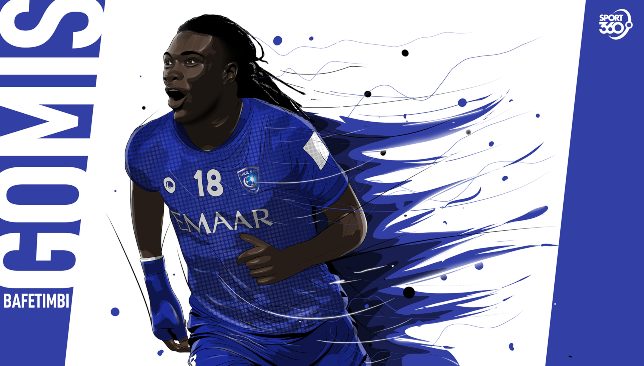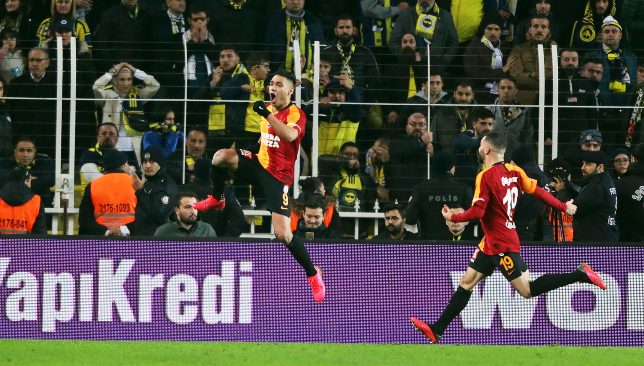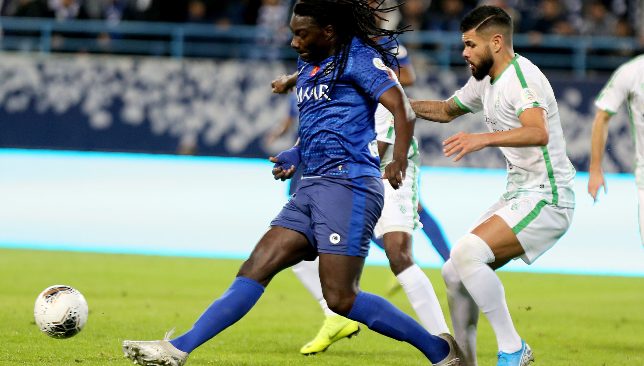
Bafetimbi Gomis’ uncertain future has loomed large in the minds of Al Hilal supporters.
Anguish was sparked by June’s expiration date on the contract inked in August 2018 upon arrival from Galatasaray and repeat links about the beloved ex-France centre forward’s potential switch back to Turkey with Besiktas.
Well-connected Arriyadiyah newspaper reported late last month that the 2019 AFC Champions League holder’s management had activated a clause to extend their arrangement until July 2021, with official confirmation coming soon. The same publication, however, detailed last weekend a freeze on all football business at King Saud University Stadium amid the ongoing coronavirus pandemic.
Would Hilal make a rational decision to renew ties with a scorer of 52 goals in 72 matches clad in dark blue? Or would the, rumoured, €7.8 million cost of annual wages be better spent elsewhere rather than on an ageing figurehead who turns 35-years old before the 2019/20 Saudi Professional League’s, purported, resumption date of August 15, amid links to Galatasaray superstar Radamel Falcao – also 34 – and Guangzhou Evergrande forward Anderson Talisca?
The evidence, anecdotal and empirical, points to only one answer.
THE LION KING
Gomis and Hilal have proven the perfect match since he first touched down in the Kingdom.
A place in club history was forever enshrined by the gala injury time goal during November’s 3-0 dismantling of Japan’s Urawa Red Diamonds, thus ending a pained 19-year wait to become continental kings once more.
This stretched a lead in the tournament’s scoring ranks to 11. A further three goals in two outings during 2020’s curtailed running is the joint most, alongside Al Sadd’s Hassan Al Haydos and Vissel Kobe’s Keijiro Ogawa.
Only relentless Al Nassr striker Abderrazak Hamdallah – 2019’s global top scorer with 57 goals – has bettered him among Saudi-employed players since their arrivals.
Gomis has contributed 29.7 per cent of Hilal’s Saudi Professional League goals (35/118) across both seasons. A combined tally of 11 assists is the most within their roster.
Hilal missed out on the 2018/19 crown by just one point and boast a six-point lead in the postponed 2019/20 edition.
Then there are the less-tangible elements.

Radamel Falcao (l) (EPA).
Gomis swiftly ingratiated himself with the Hilal faithful on social media thanks to a love of ‘gahwa’ (Arabic coffee), embracing of his ‘Lion King’ persona and smooth acclimatisation to Saudi customs. His 1.5 million followers on Instagram are regularly treated to pictures of him donning a traditional ‘thawb’ (an ankle-length garment, usually with long sleeves).
The gregarious La Seyne-sur-Mer-native also helps knit together a multicultural attack that typically contains Peru flyer Andre Carrillo, Saudi Arabia winger Salman Al Dawsari, former Italy maestro Sebastian Giovinco and himself.
A clear commitment has been exhibited, on and off the pitch, by Gomis. Any aspersions about a leisurely final payday in the Middle East have been utterly confounded.
These combine to make him a ‘known factor’. Falcao, for example, represents a glamorous gamble.
There is no guarantee the Colombia striker would fit so aptly into coach Razvan Lucescu’s system, nor adapt so completely to Saudi Arabian life.
At a time of such disruption, why risk substantive change for someone with 10 goals in 20 run-outs for Gala this term?
BUT WHAT DOES THE FUTURE HOLD?
Talk about change to Hilal’s seven-player foreign quota has continued unabated.
This has been particularly eye-opening when it has come to Falcao.
Lucescu’s astounding recent success at Greece’s PAOK and Hilal was earned via a 4-2-3-1 formation.
Even a slight alteration to a 4-4-2 in Hilal’s final few fixtures before March 14’s indefinite postponement saw either Giovinco, Brazilian talisman Carlos Eduardo or Syria forward Omar Khrbin support Gomis. None of this trio resemble, in any aspect, a second traditional No9 like Falcao.
There is, quite simply, no space for both of them at Hilal. Especially if the substantial impact on payroll is taken into account.
For Falcao to arrive in Riyadh, the odds heavily point towards Gomis exiting.
A dreary final four matches before the stoppage featured no goals, one attempt on target and three off target. This saw grumblings, in certain quarters, aired about waning powers.
Never mind that five goals had flowed in the four prior fixtures. Or that 2019/20’s abridged haul of 26 goals in 36 matches had come at an average of one every 106.7 minutes, comparing favourably to 2018/19’s 31 goals in 42 matches at an average of one every 119 minutes.
Another feasible scenario in which Gomis departs is framed within a desire to drastically reshape the non-Saudi quota.
Eduardo, Khrbin, Carrillo, Giovinco and the Frenchman – to varying degrees – have all been linked with exits. This tumult could be accelerated by lingering rumours about a return to a foreign quartet, forced by the economic damage of coronavirus.
But should Gomis be sacrificed, whether that is for Falcao or an even-younger model?
The latest reports from Turkish newspaper Takvim state that a two-year contract extension has been formalised for the former, with interest in the latter being duly shelved.
Unless an iron will – not expressed publicly – to exit the Kingdom can’t be quelled, this is the only sensible choice. The ‘Lion King’, clearly, is still in possession of a fearsome bite.

Bafetimbi Gomis (l) (EPA).